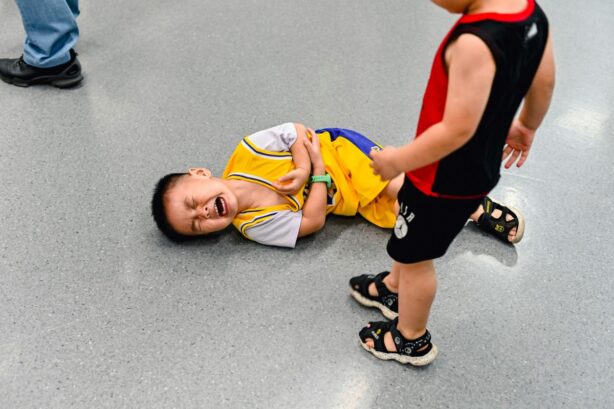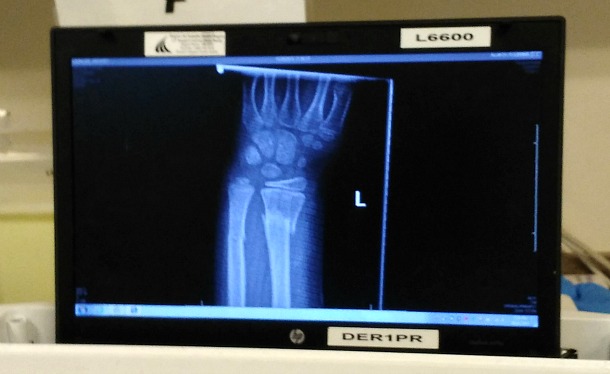Injuries are an inevitable part of life, especially for active children who love to run, jump, and play.
Yet, whether it’s a minor scrape or a more serious injury, seeing your child in pain can be incredibly distressing for any parent.

It’s essential to remember that injuries are a part of growing up, and learning how to cope with them is an important life skill.
As parents, our role is not only to provide comfort and support but also to teach our children how to manage the physical and emotional challenges that come with being injured.
Whether your child’s injuries are minor or major ones, consider these tips to help ensure your child is able to deal with their injury in a healthy way:
Understanding the Impact of Injury
Before diving into strategies for helping your child cope with an injury, it’s crucial to understand the impact that it can have on them, both physically and emotionally.
Depending on the severity of the injury, your child may experience pain, discomfort, and limitations in their mobility.
These physical challenges can be especially frustrating for a child, and may lead to feelings of helplessness or even anger.
Injuries can also take a toll on your child’s emotional well-being. They may feel upset about missing out on activities they enjoy or worry about falling behind in school or sports.
Feelings of sadness, helplessness, and anxiety are common reactions to injury, and it’s essential to validate and address these emotions.
Considering Legal Representation
When your child is injured, one of the first questions that may come to mind is: who is responsible? Liability can vary depending on the circumstances surrounding the injury.
In cases involving negligence, such as car accidents or injuries caused by poorly maintained property, the liable party may be held accountable for your child’s injuries.
Gathering evidence and documentation to support your claim is important, including witness statements, medical records, and photographs of the accident scene.
If your child’s injury was caused by another person’s negligence or wrongful actions, enlisting the aid of legal representation is imperative.
Expert personal injury lawyers in Seminole County mention that hiring a lawyer can provide you with a crucial ally, offering guidance and advocacy to safeguard your child’s rights and secure compensation.
Take the time to select a lawyer with plenty of experience handling cases similar to yours, equipped with a track record of success.
Collaborating with a seasoned legal professional not only alleviates the burden of legal proceedings but also enhances the likelihood of achieving a favorable outcome in your family member’s case.
Practical Strategies for Helping Kids Recover From Injuries
The road to recovery can sometimes be a long and painful process for a child that’s suffered an injury.
Use these tips to help ensure you’re supporting your child through their recovery:
Stay Calm and Reassuring
As a parent, your reaction to your child’s injury sets the tone for how they will cope with it.
It’s only natural to feel concerned or anxious when your child gets hurt, but it’s essential to stay calm and reassuring.
Your child will look to you for comfort and guidance, so try to maintain a positive and composed demeanor, even if you’re feeling worried.
Assure your child that everything will be okay and that you’re there to help them through this challenging time.
Let them know that it’s normal to feel scared or upset about being injured, and reassure them that they will get better with time and proper care.
Provide Comfort and Support
Physical comfort can be one of the most important ways for you to help your child cope with the pain and discomfort of their injury.
Depending on the nature of the injury, this may involve applying ice packs, bandaging wounds, or administering pain medication as directed by a healthcare professional.
Be gentle and patient as you attend to your child’s needs, and encourage them to communicate openly about any pain or discomfort they are experiencing.
In addition to physical comfort, emotional support is also crucial when helping your child deal with an injury.
Encourage your child to express their feelings and concerns openly, and listen attentively without judgment. Offer words of encouragement and praise for their bravery and resilience in dealing with the injury.
Keep Them Occupied
Being sidelined by an injury can be boring and frustrating for children, especially if they are used to being active and on the go.
Help alleviate feelings of boredom and cabin fever by finding alternative activities that your child can enjoy while they recover.
Consider activities that are low-impact and gentle on the injured area, such as reading, drawing, or playing board or video games.
You can also explore creative outlets like crafting or storytelling to keep your child entertained and engaged.
Maintain Routine and Structure
Injuries can disrupt your child’s normal routine, which can be disorienting and unsettling for them. To help maintain a sense of stability and normalcy, try to stick to familiar routines as much as possible.
Keep bedtime and mealtimes consistent, and try to incorporate elements of your child’s routine into their day, even if they are unable to participate fully.
This sense of structure can provide comfort and reassurance to your child as they navigate the challenges of being injured.
Encourage Positive Thinking
Maintaining a positive outlook can make a big difference in how your child copes with their injury. Encourage them to focus on the things they can do rather than dwelling on the things they can’t.
Help them set realistic goals for their recovery and celebrate each milestone along the way.
Encourage them to visualize themselves improving and returning to their favorite activities stronger than ever.
Seek Professional Help if Needed
If you’re concerned your child’s injuries are causing significant distress, always err on the side of caution and seek professional help.
A pediatrician or orthopedic specialist can provide expert medical care and guidance tailored to your child’s specific needs.
Additionally, if your child is struggling with their emotional well-being in response to their injury, consider seeking support from a mental health professional.
Therapy or counseling can provide a safe space for your child to process their feelings and develop coping strategies for managing their emotions.

Dealing with an injury can be a challenging and overwhelming experience for children and parents alike.
However, by providing comfort, support, and encouragement, you can help your child navigate the physical and emotional challenges of being injured.
Remember that, in most cases, the most important thing you can do for your child is be there for them in whatever way they need.
With patience, understanding, and support, you can help your child heal from their injury and emerge stronger and more resilient than ever before.
